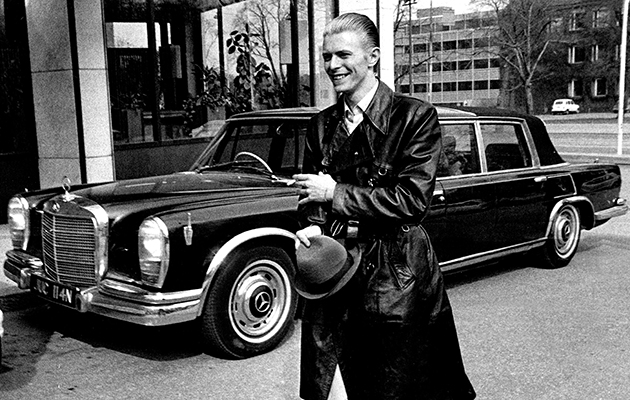As it happened, Bowie embraced Brian Eno’s deconstructionist methods and took them to another level. He added vocals to “Warszawa” in an invented tongue based on recordings of a Balkan boys’ choir, which Visconti treated with a pitch-warping machine called an Eventide Harmonizer that “fucks with the fabric of time”. Rather like the dry, squashed wallop of the gated snare drum which Visconti pioneered on Low, this sound would later come to dominate ’80s stadium rock.
For such an experimental album, Eno did indeed have a deep impact. It was credited with helping to inspire several generations of synth-pop bands in the late ’70s and early ’80s, from Gary Numan to Ultravox to Human League. Joy Division reportedly borrowed their early name, Warsaw, from the track “Warszawa”. Later, as New Order, they made an unsuccessful attempt to record using Eno’s Oblique Strategies method.
But the superficially futurist sheen of Eno has been worn away by history and its instrumental pieces now sound like pure emotion, as timeless as Gregorian chants, as transcendent as religiously inspired neo-classical masters Arvo Pärt or Henryk Gorecki. Bowie would later talk of the album’s “pure spirituality”. In the ’90s, glacial minimalist Philip Glass adapted three Low tracks into a symphony, followed by works based in the other two Berlin albums.
At the time, however, Low proved too far out for Bowie’s record company. After returning to Berlin’s Hansa studios to finish mixing and vocals, David delivered the album tapes to his panic-stricken label in London. Aghast at this chilly new direction, RCA dropped the LP from the Christmas release schedules. One executive reportedly suggested buying the star a house in Philadelphia in return for supplying another warm, commercial, disco-soul smash in the vein of Young Americans. All to no avail.
Contractual wrangles aside, the demons surrounding Bowie in ’76 were still not wholly exorcised by Low. In November, he had another dramatic confrontation with Angie in Berlin. She considered it their “one last chance at reconciliation”, but it ended with David collapsing from chest pains and being rushed to the British Army clinic. Later diagnosed as an anxiety attack, possibly caused by excessive drinking, this showdown was effectively the last straw for David and Angela’s marriage. Incensed by Coco Schwab’s influence over Bowie, Angie’s final act of defiance followed soon after. She returned to the Schöneberg flat and took revenge on her absent rival. “I went into Coco’s room,” Angie later wrote, “gathered up her clothes and some of the gifts I’d given her in better times, threw them out of the window, called a cab and caught a flight to London.”
Low was finally released in January ’77, followed by the incongruously jaunty hit “Sound And Vision” in February. Scoring an effortless Number 2 on the IIK charts and an impressive Number 11 in America, the album defied both Bowie’s doubters at RCA and his sternest press critics, many of whom damned Low as an almost personal betrayal. The polarised press reaction to Low was most strikingly embodied by NME, where a rare double-header review by Ian MacDonald and long-time Bowie champion Charles Shaar Murray took diametrically opposite positions. MacDonald called the record “stunningly beautiful… the sound of Sinatra reproduced by Martian computers with no access to the English language.” Conversely, Murray poured scorn on “an album so negative that it doesn’t even contain emptiness or the void… Low is the sound of nothing and even the nothing is elusive… a state of mind beyond desperation… it stinks of artfully counterfeited spiritual defeat…”
Significantly, Low also arrived at the height of punk. Bowie denies any subliminal connection between his bleak Berlin period and the anti-star, alienated, apocalyptic mood of rock’s new revolutionaries. “You’ve just described my frame of mind in 1976,” he quips. As Jon Savage wrote in England’s Dreaming, both Low and “Heroes” had a “huge impact” during punk: “For every person who saw the necessity of getting into the world, of becoming politically active and thus translating the original commitment of punk into a fierce, organised protest campaign, there was another who wanted to get out of this world: to disengage, to sort out the turmoil within their own heads…”



